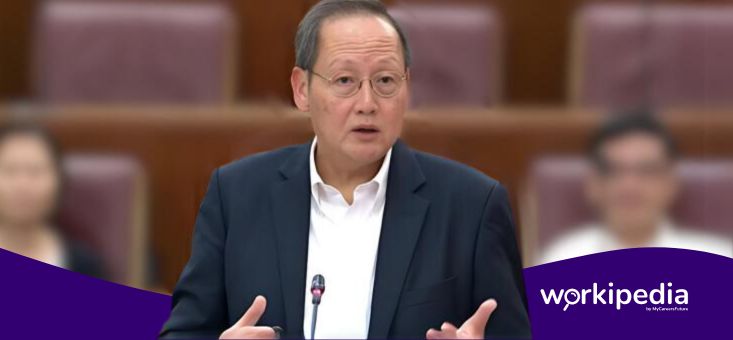In the midst of a fast-changing employment landscape, Minister for Manpower Tan See Leng admitted that it would not be easy for Singapore workers in the coming times.
Speaking in Parliament during the Committee of Supply (COS) 2024, he said: “In the next decade, it will become harder for us to sustain high economic growth primarily from workforce growth.
“The only sustainable approach is to pursue productivity-driven growth — enabling our local workers to move up the value chain and taking in foreign workers who can complement our local workers.”
“If we do not succeed in sustaining our productivity in the next 10 years, my worry is that we will suffer real declines in economic growth.
“Businesses and talent will find Singapore less attractive. As a result, we will create fewer good jobs for Singaporeans, and incomes will stagnate.
“We’ve seen this happen in other mature economies like in Europe. But Singapore has a way to buck the trend.
But Minister Tan believes that Singapore has a chance to write a different story.
“There are exciting developments on the horizon. With the accelerating pace of transformation, there will be more opportunities in new areas like the green economy and artificial intelligence, or AI. “
At the COS, he underlined that MOM’s priorities are centred on three themes: Strengthening you, Uplifting you, and Caring for you; and shared three focus points for Singaporean workers in 2024:
- Helping businesses become more productive, and local workers to take on better jobs.
- Ensuring no Singaporean worker is left behind, including senior and lower-waged workers.
- Fostering more inclusive and fair workplaces, and empowering senior workers to continue working, if they wish.
Here are some key highlights of some of the programmes and schemes that will be launched and enhanced to that end.
COS 2024 in a nutshell
- Uplifting lower-wage workers
- Providing support for the involuntarily unemployed
- Government support and career planning for senior workers
- Overseas opportunities provided for local workers
- Encouraging women and caregivers to return to the workforce
- Supporting people with disabilities at work
- More support for employers hiring and reskilling workers
- Enhancement of the CareersFinder tool on MyCareersFuture Job Portal
Continuing to uplift lower-wage workers and helping employers to do so
Senior Minister of State (SMS) for Manpower Mr Zaqy Mohamad shared in Parliament how 2024 is a “momentous milestone in Singapore’s journey of uplifting our lower-wage workers, as it marks the 10th anniversary of our Progressive Wage Model (PWM).”
He revealed that since the PWM was launched, the real incomes of lowest-wage workers at the 20th percentile have risen cumulatively by 30% in the last ten years, faster than the median worker at 22%.
“Today, more than 155,000 lower-wage workers across 9 sectors and occupations are covered by the PWM. This is more than five times the coverage since 2020, so we have expanded quite significantly since 2020,” SMS Zaqy shared.
In order to build upon existing efforts to uplift lower-wage workers, a key step that was announced was raising the Local Qualifying Salary (LQS) to keep pace to wage growth and maintain foreign workforce controls. The last time the LQS threshold was updated was 2020, before the Covid-19 pandemic.
The LQS threshold will be raised from $1,400 to $1,600 for full-time local employees to better support lower-wage workers. The LQS threshold for part-time local employees will also be increased from $9 per hour to $10.50 per hour.
There will also be an increase in the qualifying monthly income cap for both Workfare Income Supplement Scheme (WIS) and Workfare Skills Support (WSS), SMS Zaqy added.
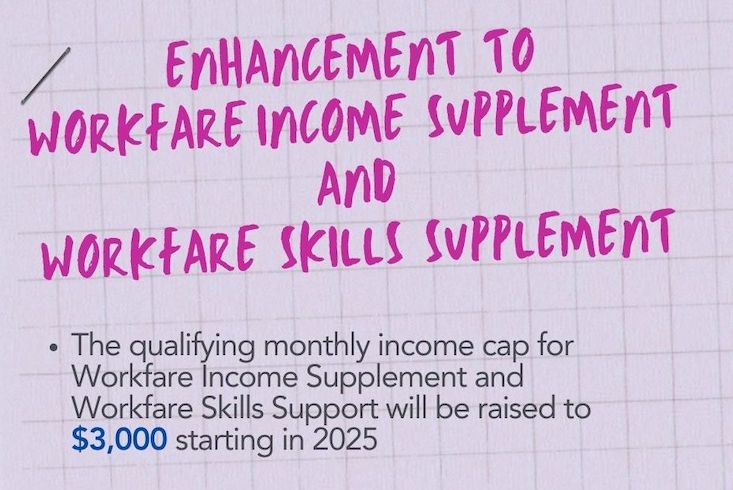
From 2025, MOM will raise the qualifying monthly income cap further—from $2,500 to $3,000—for both WIS and WSS. This ensures Workfare continues to help workers in the bottom 20th income percentiles, with some support for those slightly above.
WIS payments will also be raised, with the maximum payment increased to $4,900 per year, up from $4,200. Those aged 60 and above will benefit from this highest payment tier and all persons with disabilities, regardless of age.
It was revealed that payments for all other qualifying age groups will also be increased.
- Those aged 30 to 34 will receive a maximum payment of $2,450 per year.
- Those aged 35 to 44 will receive a maximum payment of $3,500 per year.
- Those aged 45 to 59 will receive a maximum payment of $4,200 per year.
These enhancements will benefit around half a million lower-wage workers. WIS payments will increase to $1.4 billion in 2025, up from $1.1 billion last year.
The Progressive Wage Credit Scheme (PWCS) will be enhanced to strengthen support for employers in increasing wages of lower-wage workers, through increased Government co-funding support for 2024, and a higher wage ceiling for 2025-2026.
SMS Zaqy said in Parliament: “Many employers have done their part. They have continued paying their lower-wage workers good wages and upskilled them – even for those who are not on PWM, and despite challenging economic conditions.
“We need to be mindful of the impact of Progressive Wages on employers in the short run. We should ensure that as we uplift lower-wage workers, we do not inadvertently harm workers’ prospects or risk widespread job losses.”
Through PWCS, the Government has supported wage increases for lower-wage workers.
- For wage increases given in 2022, the Government disbursed about $1 billion of PWCS funding to employers.
- Ultimately, the PWCS helped co-fund wage increases given to more than 345,000 employees by over 70,000 employers.
- The median monthly wage increase supported by PWCS was about $300.
SMS Zaqy confirmed during the COS that the Government will continue providing transitional support to employers through PWCS over the next few years.
In addition, the government will further enhance PWCS in 2024 to help employers cope with PWM and LQS increases, given the more challenging economic environment.
He shared: “First, we will increase the Government’s co-funding for wage increases given in 2024. This builds on earlier enhancements in 2022 and 2023, at 75% co-funding.
“With this year’s enhancement, the Government will co-fund up to 50% of wage increases given by employers to eligible lower-wage workers in 2024 – up from the original 30%. This includes workers who are not covered by any PWM.
“Second, we will raise the wage ceiling in 2025 and 2026 to $3,000 – up from $2,500 per month. With this enhancement, PWCS will continue to support increases of wages up to $3,000 beyond 2024.”
Full details are at the PWCS website.
Workers who experience employment setbacks will be supported

During Budget 2024, Deputy Prime Minster Lawrence Wong, who is also Singapore’s Finance Minister, shared on a temporary financial support scheme that will be introduced later in 2024 to support those involuntarily unemployed.
Minister Tan shared that a financial lift to tide them over their job hunt period is being developed for jobseekers who face repeat rejections.
“We are close to finalising the scheme parameters and I want to assure the House that we have indeed looked at best practices around the world.”
“For example, our pay-outs will be conditional on jobseekers making the effort to actively search for a job.”
This will avoid the unintended consequences faced by other countries in implementing similar schemes, he added.
Senior workers’ career concerns will be looked after
Minister of State (MOS) for Education and Manpower Gan Siow Huang shared how given Singapore’s ageing population and slowing workforce growth, it is important that we help “every worker contribute as much as they are able to, for as long as they wish.”
As it stands, Singapore’s employment rate for seniors aged 65 to 69 is now ranked third compared to OECD (Organisation for Economic Co-operation and Development) countries, increasing by almost 5 percentage points, from 43.8% in 2018 to 48.3% in 2023.
Among our younger seniors aged 55 to 64, the employment rate also rose, from 66.8% to 70.0% over the same period. “But we can do more to support our seniors”, Minister Gan said.
As such, she announced that to support senior workers to continue working if they wish to, the retirement and re-employment ages will be raised to 64 and 69 respectively in 2026. Companies must offer eligible staff re-employment until that age, though on adjusted terms if necessary, or employment assistance in its place. By 2030, Singapore’s re-employment age will be increased to 70.
In addition, the Government is rolling out a $8.2 billion Majulah Package to support all Singaporeans born in 1973 or earlier. Beyond the Majulah Package, existing schemes will be enhanced to provide greater assistance to those who need more support.
This includes enhancements to the Silver Support Scheme and the Matched Retirement Savings Scheme, as well as the next step of the increase in senior workers’ CPF contribution rates.
For the Matched Retirement Savings Scheme, its dollar-for-dollar matching on cash top-ups will be increased from $600 to $2,000 annually. In addition, the scheme will be extended to those older than 70, which will double the number of eligible Singaporeans to about 800,000 a year.
An example of how the Majulah Package worked for a young senior was referenced by Minister Tan in Parliament. Caroline Ng, who is 54 years old, is living with her husband and son in a four-room flat; she also supports her elderly mother-in-law.
While she started her career in human resources, she stopped working to take care of her son, who was still growing up then, and the elderly in her family. But as her son grew more independent, Caroline decided to rejoin the workforce in 2020 with the help of a career coach from WSG.
She shared how the Majulah Package would help her during this sandwiched phase of life:
- The Earn and Save Bonus and Retirement Savings Bonus will help her set aside more CPF savings, as they translate into higher retirement payouts. She will be a step closer to her goal of building up her retirement fund for her golden years.
- In addition, Ms Ng, her husband, and her elderly mother-in-law will receive the MediSave Bonus to pay for their own healthcare needs.
“I hope that the Earn and Save Bonus will help more older Singaporeans carry on working if they can, and if they wish to,” Minister Tan said.
Employers will also get help providing senior workers with job opportunities, as the Part-time Reemployment Grant (PTRG) was extended last year to support more flexible work options. Employers can enjoy up to $125,000 in grant support under this scheme.
MOS Gan shared: “As of December 2023, with the support of PTRG, more than 6,300 employers committed to providing part-time reemployment under the HR policy. This is expected to benefit around 50,000 senior workers.”
The PTRG also supports employers in implementing Structured Career Planning (SCP).
SCP is a process where employers systematically engage their employees and plan out their training and career development goals to align with business needs. This is particularly useful for employees who are approaching retirement.
Through the PTRG, employers can access free training to learn how to conduct SCP with their employees. Employers can also receive support through the Senior Employment Credit. The SCEC provides wage offsets to employers who hire Singaporean workers aged 60 and above.
The support given is significant. In 2023, MOM disbursed $315 million, benefiting about 90,000 employers that hire more than 400,000 senior workers.
However, MOS Gan added that supporting seniors to remain in the workforce is not just a matter of creating job opportunities.
“Employees must also do their part”, she said.
“Most senior workers today are re-employed in the same job role. But with longer lifespans and careers and a faster pace of economic change, we should not expect to perform the same job role year after year.
“Senior workers must also keep pace with changes in the labour market and be open to learning new skills or trying out new roles.”
Opportunities for Singaporean workers to get overseas exposure

Minister Tan revealed that business leaders in Singapore have consistently told him how overseas experience is valuable for career progression, in particular for corporate leadership positions.
In order to support Singaporeans to venture overseas and progress in their careers, he revealed a new Overseas Markets Immersion Programme (OMIP) will be launched by WSG.
The OMIP supports companies with market expansion plans to send new mid-career hires or existing employees with little to no overseas market experience for overseas postings, where they will undergo reskilling through structured on-the-job and in-market training in global roles offering good prospects, “whether in technology, business development, or beyond,” added Minister Tan.
This will complement EDB’s new Global Business Leaders Programme (GBLP), which supports Singaporean middle to senior managers who are nominated by their companies for key developmental programmes such as overseas postings, executive management programmes, and mentorship and professional networking opportunities that will better prepare them for regional or global corporate leadership roles.
More details on the GBLP and OMIP will be announced in the next few months.
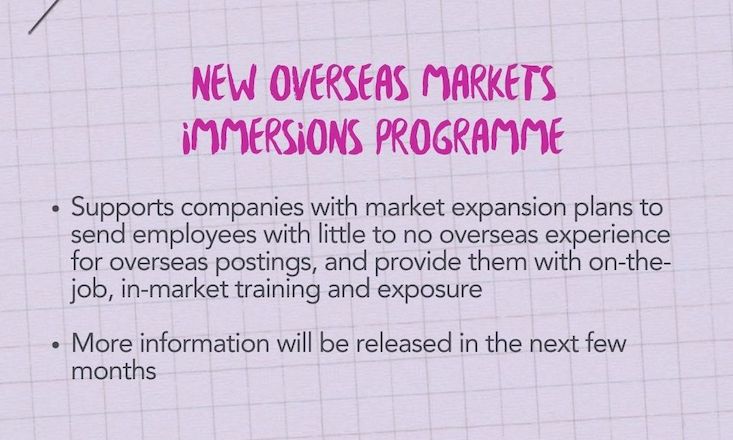
Encouraging and supporting women and caregivers to return to the workforce
MOS Gan shared that Singapore has made good progress in getting Singaporean women to restart their careers after a career break, with “our employment rate for women aged 25 to 64 increasing from 72.3% in 2018, to 76.6% in 2023.” WSG and NTUC’s E2I provide career-matching services and re-skilling support to help such individuals return to work.
“WSG launched the HerCareer Initiative in June 2022 to bring together employment facilitation programmes supporting female job seekers.
“Since then, WSG has engaged nearly 16,000 women at its career events, and WSG also runs workshops in collaboration with its partners to support women in returning to work,” she revealed.
“Since 2018, the number of women who successfully were placed in jobs through WSG’s programmes has nearly doubled, increasing from 13,000 to more than 26,000 women placed annually.”
MOS Gan brought up examples of local women who have returned to the workforce, with the value of career coaching also brought up.
She shared about Nurhani Binte Zailani Shaitifan, who used to work in the travel industry, but left to become a caregiver for her parents during the Covid-19 pandemic.
After facing challenges in returning to the workforce, the 51-year-old turned to WSG for assistance. She signed up for career coaching which helped her with interview preparation, giving her confidence boosts before each interview.
In a post-Covid world, virtual meetings have become more common. Nurhani enrolled in Yayasan Mendaki’s Women at Work programme where she learned how to facilitate Zoom meetings. She also had the support of a mentor through NTUC’s Women Supporting Women programme who encouraged her and other women on the same journey.
Through these initiatives, Nurhani, who is also a mother-of-five, received training in interview skills and new capabilities to help her adapt to new ways of working, and mentorship which helped her on her employment journey. She is now a development coordinator at INSEAD Business School.
“It is a job that she enjoys, and continues to learn and grow in,” MOS Gan added.
Supporting the employment of persons with disabilities
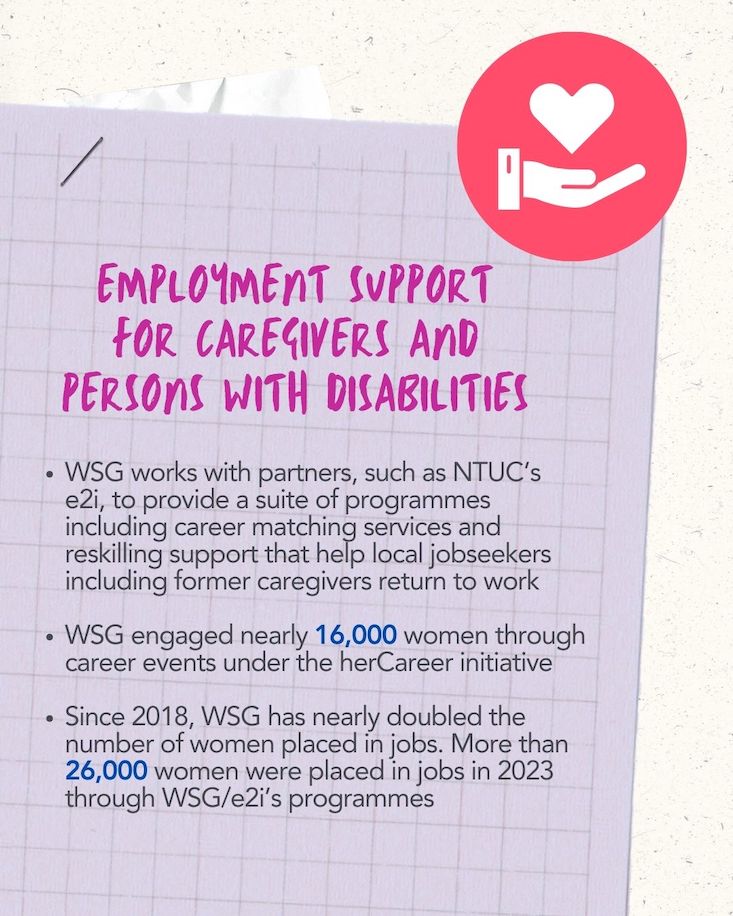
MOS Gan revealed Singapore’s employment rate for persons with disabilities (PWDs) has increased steadily to 33% in 2022-2023, moving us closer to the target of 40% by 2030 under the Enabling Masterplan 2030.
The Enabling Employment Credit will help PWDs to find jobs aligned with their skillsets and aspirations, by providing wage offsets to employers hiring persons with disabilities.
MOS Gan added that it is also important to provide PWDs with reasonable accommodation at the workplace. MOM will work with NTUC and SNEF to develop a Tripartite Advisory to guide employers on modifying jobs and workplaces to support persons with disabilities. More details on this will be released when ready.
Empowering employers to seize opportunities by hiring and reskilling local workers
The salary support cap for Workforce Singapore’s (WSG) Career Conversion Programmes (CCPs) will be raised to support employers in reskilling new hires and existing workers in new jobs:
- For mature or long-term unemployed workers who are eligible for up to 90% salary support, the salary support cap will be raised from $6,000 to $7,500 per month.
- For other CCP participants who are eligible for up to 70% salary support, there will be an increase of the salary support cap from $4,000 to $5,000 per month.
- After these enhancements, employers can receive up to $45,000 of salary support for each trainee for a typical six-month programme.
- The job roles eligible for CCP’s support will be expanded, supporting employers who proactively identify and reskill existing workers to take on growth job roles.
WSG currently offers CCPs in around 30 sectors to help mid-career jobseekers or existing employees reskill and take on new job roles with good prospects and opportunities for progression. They are developed in close collaboration with the relevant stakeholders such as sectoral agencies and industry partners.
The CCPs support reskilling in growth job roles aligned with the sectoral development and trends identified within the Industry Transformation Maps (ITMs) and Jobs Transformation Maps (JTMs).
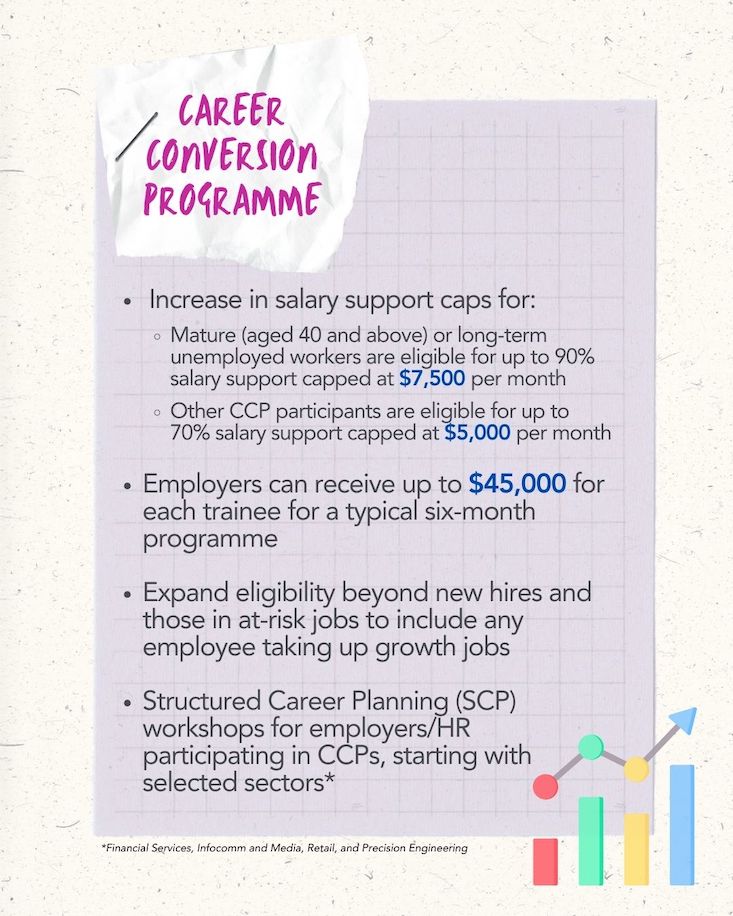
Employers will get help on job redesigning and employee training with four more jobs transformation maps, on top of the current 16 that already cover 1.5 million local workers. These new maps include two of the latest hot industries: generative artificial intelligence and sustainable finance.
There are also plans to professionalise skilled trades with structured training and career pathways, beginning with electricians, said Minister Tan.
Minister Tan added: “Going forward, we will support employers who are proactively reskilling existing workers to take on new growth job roles,
“I urge and encourage employers to get in touch with WSG to explore how they can tap on the CCP to meet their talent needs!”
In addition, current CCP reskilling support for existing employees is limited to employees presently in at-risk or vulnerable job roles. Going forward, reskilling of any existing employee taking up growth jobs identified under the ITMs or JTMs will be supported.
Businesses and employers need to transform themselves as well

While workers need to improve their skills, firms and industries must also transform, SMS Zaqy pointed out.
“Lower-wage workers tend to be in frontline roles, where their productivity growth is heavily dependent on how the firms and industries that they work in operate.
“This means that transformation must also take place at the firm- and industry-level, so that we can narrow the wage gap in a sustainable way.”
To enable employers to prepare their workers for job switches, Structured Career Planning (SCP) workshops will be provided for employers and their human resource (HR) departments to better support their employees embarking on CCP, starting with sectors such as Financial Services, Infocomm and Media, Retail and Precision Engineering.
Through the SCP workshops, prospective employers/HR will be able to conduct meaningful one-to-one career conversations with existing employees identified to undergo reskilling into new growth job roles under CCP.
This will equip line managers and HR with capabilities to support their workers in developing career development plans.
MOM is also empowering employers to adopt job redesign. SMS Zaqy shared how Workforce Singapore, in collaboration with the Institute for Human Resource Professionals (IHRP), launched the Job Redesign Centre of Excellence (JRCoE) in November 2023.
“The JRCoE serves as a one-stop centre to equip enterprises with capabilities to transform their businesses and workforce through job redesign.
“Around 20 Trade Associations and Chambers have pledged support for the JRCoE, and will be encouraging their member companies to incorporate job redesign in HR practices,” he said.
CareersFinder will be enhanced
CareersFinder is an integrated jobs and training recommender that uses data on skills adjacencies and job transitions in the labour market to help jobseekers to identify potential career opportunities. Personalised based on jobseekers’ individual profiles, it also recommend suitable training programmes to help them achieve their career goals.
Currently, individuals looking to progress in their careers or explore a new role would need to research on the career opportunities and determine their upskilling needs and suitable training courses.
CareersFinder consolidates these information and services from across Workforce Singapore’s MyCareersFuture job portal and MySkillsFuture , to provide users with personalised jobs and skills related recommendations, generated from their responses to a series of quiz questions.
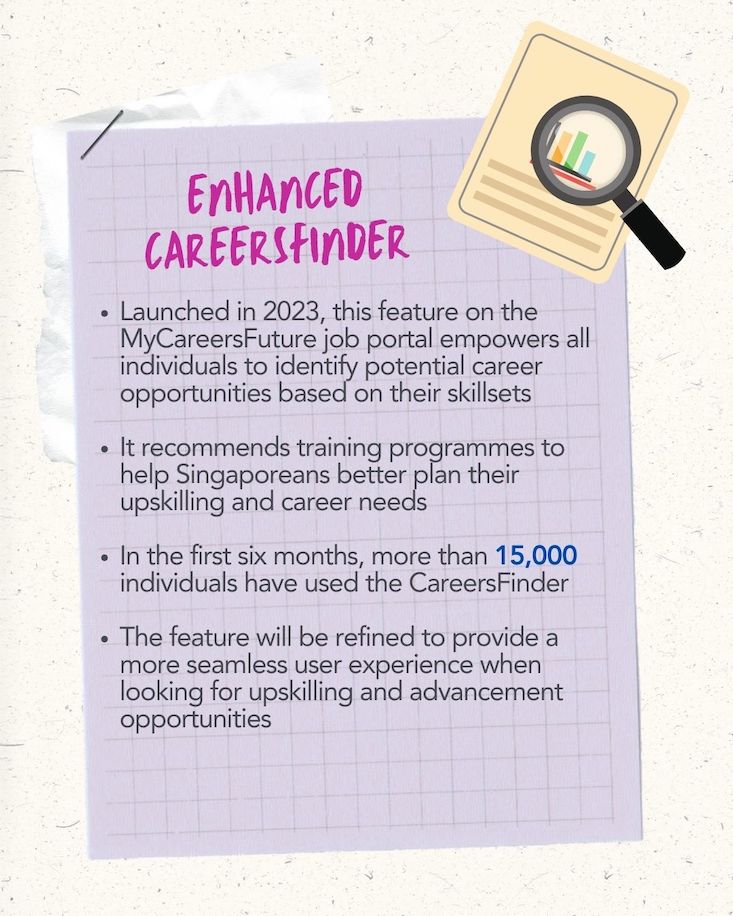
Launched in July 2023, within its first six months, more than 15,000 individuals have used the CareersFinder tool.
“These early signs are encouraging as users have gone on to broaden their horizons by applying for jobs across a wider range of occupations.”
Minister Tan revealed that the WSG programme will be enhanced to enable greater recognition of and reward for hiring and career advancement skills.
“We are looking at ways to enable workers to better signal their skills to employers or potential hirers to better recognise and reward them.
“This will strengthen the linkage between skills acquisition and career progression.
“We also want to make career guidance, both in-person and through AI-enabled digital platforms, more accessible to even more Singaporeans,” he said.
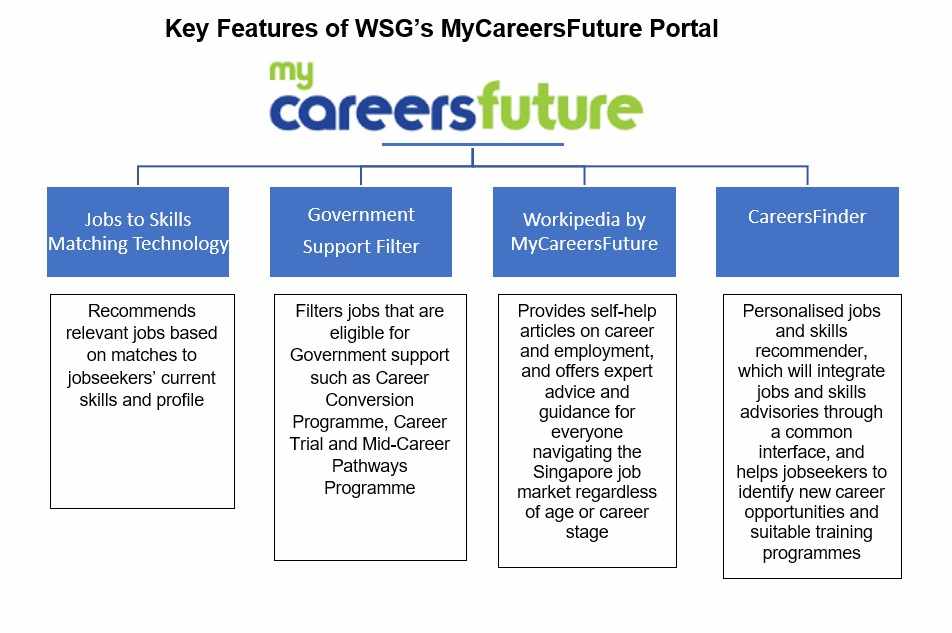
Minister Tan concluded his COS speech in Parliament by admitting that some of the policy measures announced would have an impact on manpower costs for employers and businesses.
He said: “However, I must emphasise and I want to seek everyone’s support, understanding and indulgence, that a significant part of the cost increase is going into uplifting our own local lower-wage workers and improving the livelihoods of our fellow Singaporeans.
“At the same time, as we analyse that, we also look at the profitability of our businesses.
“We still remain competitive compared to other economies. Therefore, I hope our employers can support us and carry the shared burden and responsibility of our refreshed social compact.
He concluded: “With the labour movement, employers, workers, and Government working hand-in-hand, I am confident that we can build a better future together!”

